
1 | P a g e NEWTEKONE, INC. STATEMENT OF POLICY ON INSIDER TRADING Introduction As an employee of NewtekOne, Inc. (the “Company”), a publicly traded company, or one of its subsidiaries,1 you may have access to confidential or non-public information about the Company and its subsidiaries, clients and other companies that conduct or seek to do business with us. You must protect this information from unauthorized use, including from other employees who do not have a legitimate and continuous business need to access the information. It is illegal for any person, either personally or on behalf of others, to trade in securities on the basis of material, non-public information. It is also illegal to communicate (or “tip”) material, non-public information to others who may trade in securities on the basis of that information. These illegal activities are commonly referred to as “insider trading.” Potential penalties for each insider trading violation include imprisonment for up to 10 years, civil fines of up to three times the profit gained or loss avoided by the trading, and criminal fines of up to $1 million. In addition, a company whose director, officer or employee violates the insider trading prohibitions may be liable for a civil fine of up to the greater of $1 million or three times the profit gained or loss avoided as a result of the director, officer or employee’s insider trading violations. Furthermore, engaging in short-term trading or other speculative transactions involving the securities of the Company may subject you to additional penalties. Moreover, your failure to comply with the insider trading policy of the Company, as set forth herein, may subject you to sanctions imposed by the Company, including dismissal for cause, whether or not your failure to comply with this Statement of Policy on Insider Trading (the “Policy”) results in a violation of law. This Policy sets forth the Company’s policy against insider trading. The objective of this Policy is to protect both you and the Company from securities law violations, or even the appearance thereof. All directors, officers and employees (including temporary employees) of the Company and its subsidiaries must comply with this Policy. You are encouraged to ask questions and seek any follow-up information that you may require with respect to the matters set forth in this Policy. Please direct any questions you may 1 NewtekOne’s subsidiaries include Newtek Bank, N.A. (and its subsidiary Small Business Lending, LLC), Newtek Small Business Finance, LLC, Newtek Merchant Solutions, LLC, Newtek Payroll & Benefits Solutions, LLC, Newtek Insurance Agency, LLC, POS on Cloud, LLC and Mobil Money, LLC.
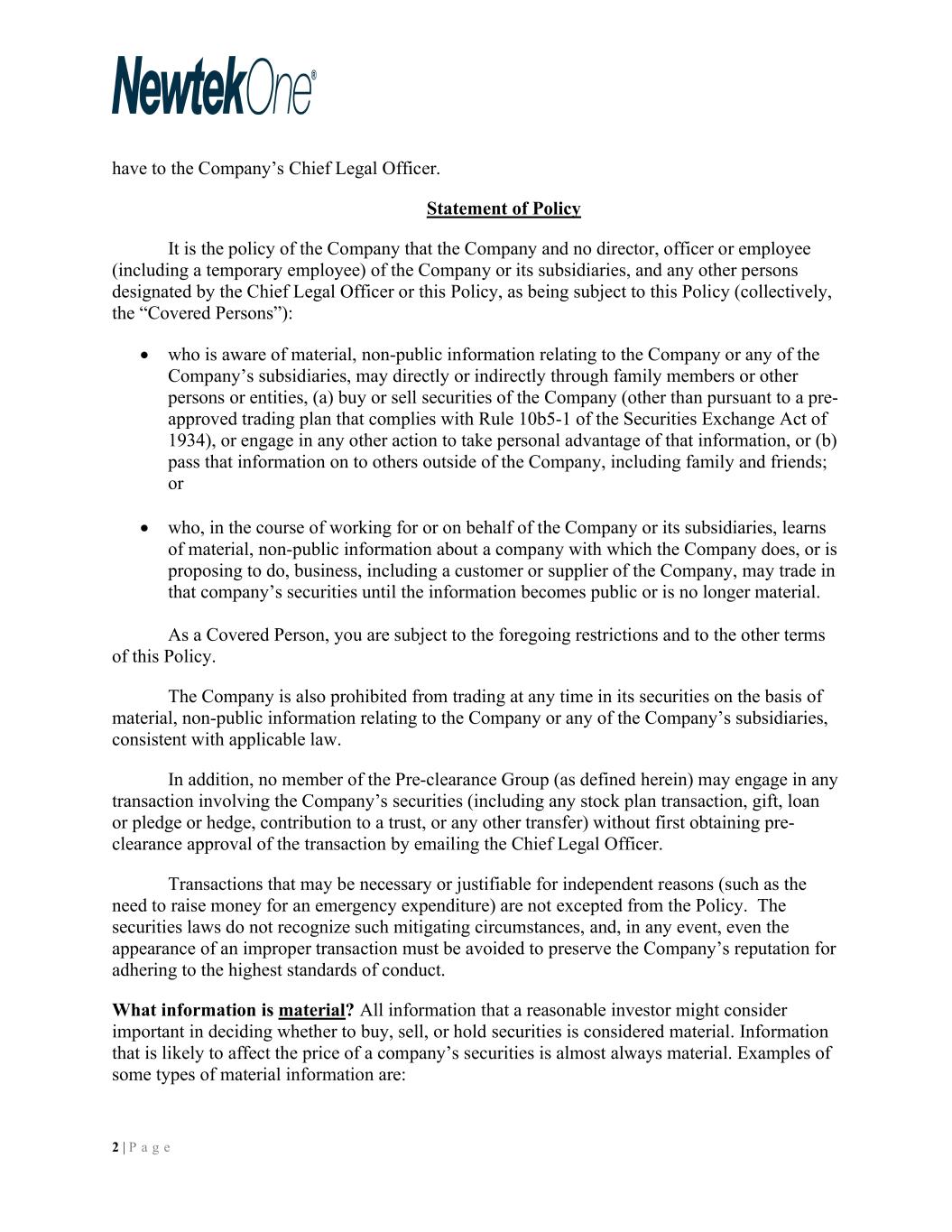
2 | P a g e have to the Company’s Chief Legal Officer. Statement of Policy It is the policy of the Company that the Company and no director, officer or employee (including a temporary employee) of the Company or its subsidiaries, and any other persons designated by the Chief Legal Officer or this Policy, as being subject to this Policy (collectively, the “Covered Persons”): who is aware of material, non-public information relating to the Company or any of the Company’s subsidiaries, may directly or indirectly through family members or other persons or entities, (a) buy or sell securities of the Company (other than pursuant to a pre- approved trading plan that complies with Rule 10b5-1 of the Securities Exchange Act of 1934), or engage in any other action to take personal advantage of that information, or (b) pass that information on to others outside of the Company, including family and friends; or who, in the course of working for or on behalf of the Company or its subsidiaries, learns of material, non-public information about a company with which the Company does, or is proposing to do, business, including a customer or supplier of the Company, may trade in that company’s securities until the information becomes public or is no longer material. As a Covered Person, you are subject to the foregoing restrictions and to the other terms of this Policy. The Company is also prohibited from trading at any time in its securities on the basis of material, non-public information relating to the Company or any of the Company’s subsidiaries, consistent with applicable law. In addition, no member of the Pre-clearance Group (as defined herein) may engage in any transaction involving the Company’s securities (including any stock plan transaction, gift, loan or pledge or hedge, contribution to a trust, or any other transfer) without first obtaining pre- clearance approval of the transaction by emailing the Chief Legal Officer. Transactions that may be necessary or justifiable for independent reasons (such as the need to raise money for an emergency expenditure) are not excepted from the Policy. The securities laws do not recognize such mitigating circumstances, and, in any event, even the appearance of an improper transaction must be avoided to preserve the Company’s reputation for adhering to the highest standards of conduct. What information is material? All information that a reasonable investor might consider important in deciding whether to buy, sell, or hold securities is considered material. Information that is likely to affect the price of a company’s securities is almost always material. Examples of some types of material information are:
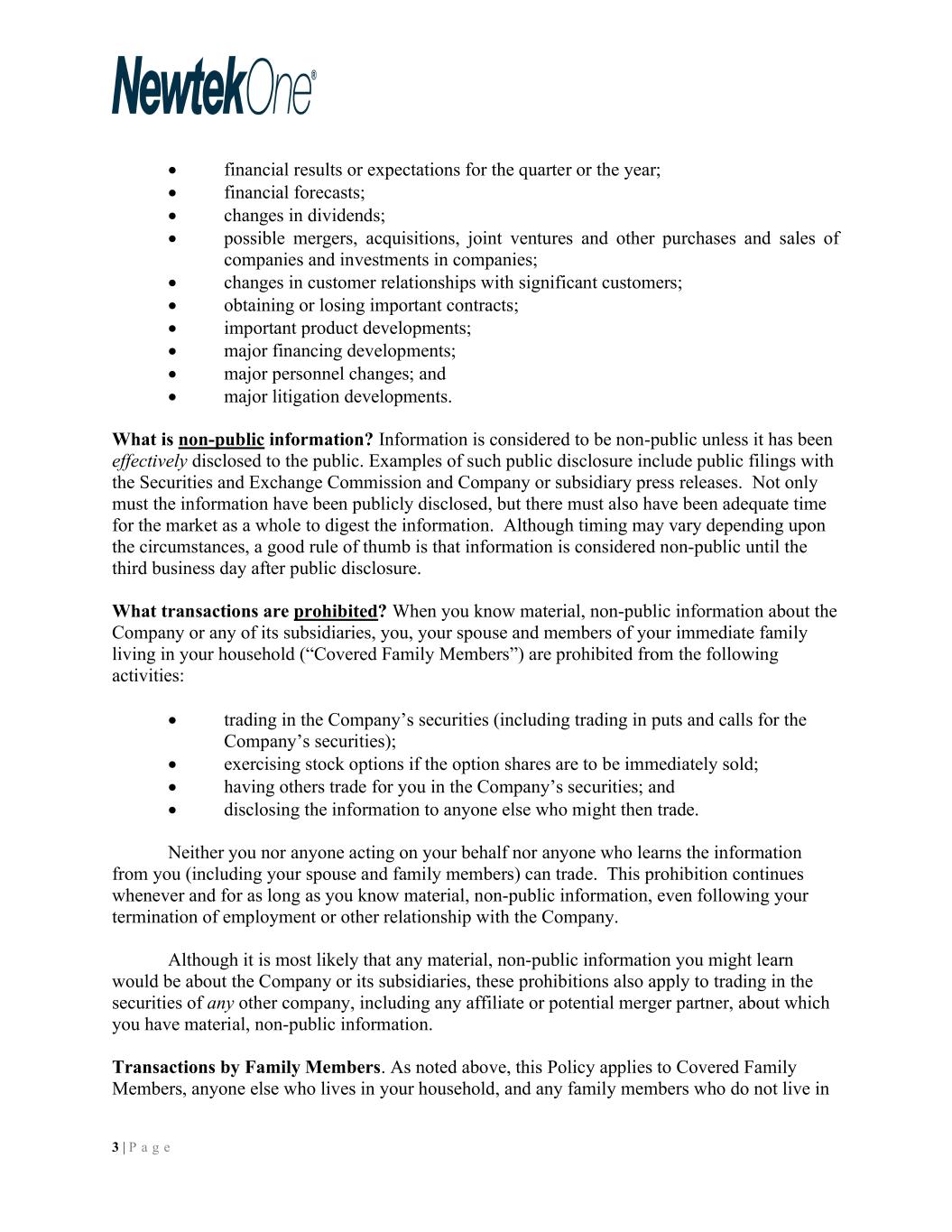
3 | P a g e financial results or expectations for the quarter or the year; financial forecasts; changes in dividends; possible mergers, acquisitions, joint ventures and other purchases and sales of companies and investments in companies; changes in customer relationships with significant customers; obtaining or losing important contracts; important product developments; major financing developments; major personnel changes; and major litigation developments. What is non-public information? Information is considered to be non-public unless it has been effectively disclosed to the public. Examples of such public disclosure include public filings with the Securities and Exchange Commission and Company or subsidiary press releases. Not only must the information have been publicly disclosed, but there must also have been adequate time for the market as a whole to digest the information. Although timing may vary depending upon the circumstances, a good rule of thumb is that information is considered non-public until the third business day after public disclosure. What transactions are prohibited? When you know material, non-public information about the Company or any of its subsidiaries, you, your spouse and members of your immediate family living in your household (“Covered Family Members”) are prohibited from the following activities: trading in the Company’s securities (including trading in puts and calls for the Company’s securities); exercising stock options if the option shares are to be immediately sold; having others trade for you in the Company’s securities; and disclosing the information to anyone else who might then trade. Neither you nor anyone acting on your behalf nor anyone who learns the information from you (including your spouse and family members) can trade. This prohibition continues whenever and for as long as you know material, non-public information, even following your termination of employment or other relationship with the Company. Although it is most likely that any material, non-public information you might learn would be about the Company or its subsidiaries, these prohibitions also apply to trading in the securities of any other company, including any affiliate or potential merger partner, about which you have material, non-public information. Transactions by Family Members. As noted above, this Policy applies to Covered Family Members, anyone else who lives in your household, and any family members who do not live in
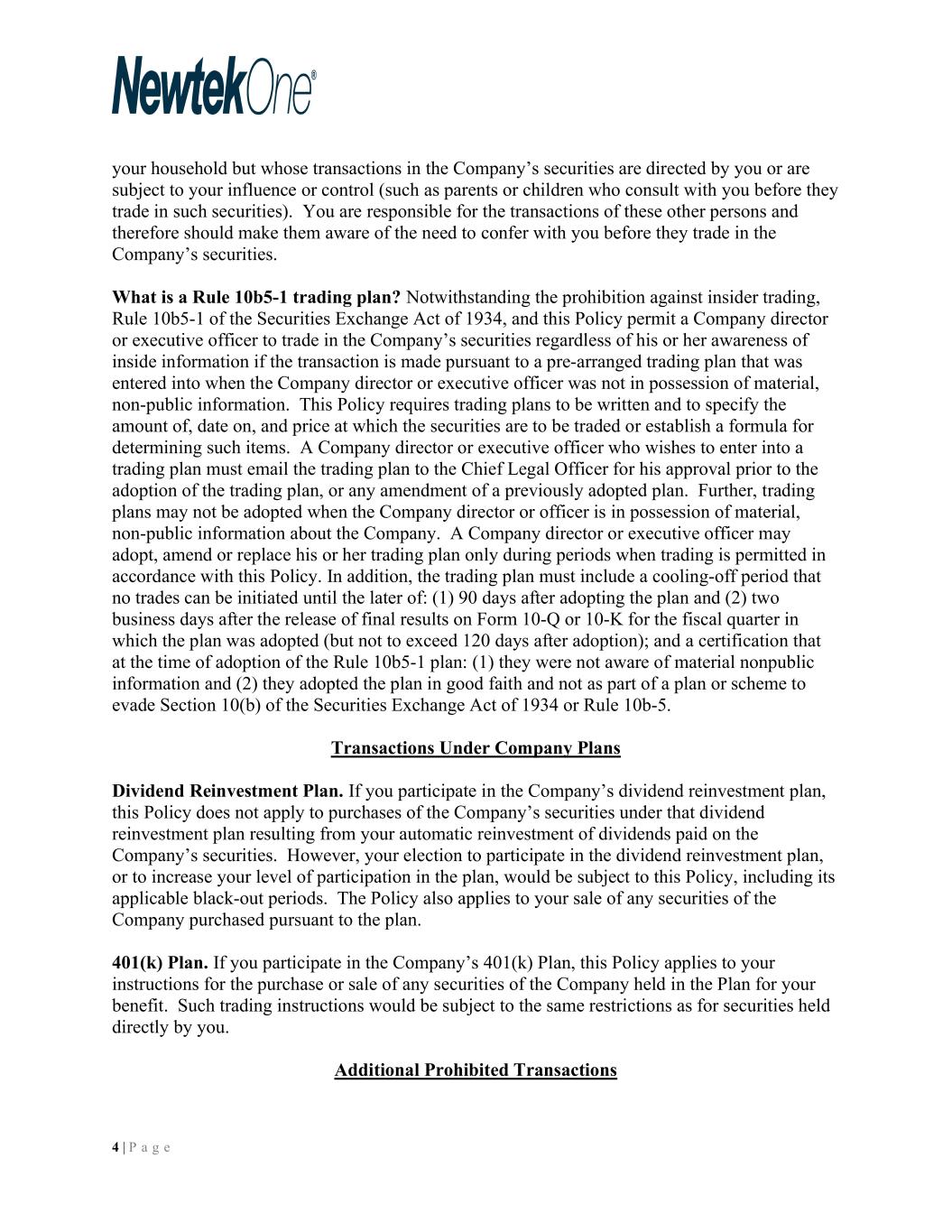
4 | P a g e your household but whose transactions in the Company’s securities are directed by you or are subject to your influence or control (such as parents or children who consult with you before they trade in such securities). You are responsible for the transactions of these other persons and therefore should make them aware of the need to confer with you before they trade in the Company’s securities. What is a Rule 10b5-1 trading plan? Notwithstanding the prohibition against insider trading, Rule 10b5-1 of the Securities Exchange Act of 1934, and this Policy permit a Company director or executive officer to trade in the Company’s securities regardless of his or her awareness of inside information if the transaction is made pursuant to a pre-arranged trading plan that was entered into when the Company director or executive officer was not in possession of material, non-public information. This Policy requires trading plans to be written and to specify the amount of, date on, and price at which the securities are to be traded or establish a formula for determining such items. A Company director or executive officer who wishes to enter into a trading plan must email the trading plan to the Chief Legal Officer for his approval prior to the adoption of the trading plan, or any amendment of a previously adopted plan. Further, trading plans may not be adopted when the Company director or officer is in possession of material, non-public information about the Company. A Company director or executive officer may adopt, amend or replace his or her trading plan only during periods when trading is permitted in accordance with this Policy. In addition, the trading plan must include a cooling-off period that no trades can be initiated until the later of: (1) 90 days after adopting the plan and (2) two business days after the release of final results on Form 10-Q or 10-K for the fiscal quarter in which the plan was adopted (but not to exceed 120 days after adoption); and a certification that at the time of adoption of the Rule 10b5-1 plan: (1) they were not aware of material nonpublic information and (2) they adopted the plan in good faith and not as part of a plan or scheme to evade Section 10(b) of the Securities Exchange Act of 1934 or Rule 10b-5. Transactions Under Company Plans Dividend Reinvestment Plan. If you participate in the Company’s dividend reinvestment plan, this Policy does not apply to purchases of the Company’s securities under that dividend reinvestment plan resulting from your automatic reinvestment of dividends paid on the Company’s securities. However, your election to participate in the dividend reinvestment plan, or to increase your level of participation in the plan, would be subject to this Policy, including its applicable black-out periods. The Policy also applies to your sale of any securities of the Company purchased pursuant to the plan. 401(k) Plan. If you participate in the Company’s 401(k) Plan, this Policy applies to your instructions for the purchase or sale of any securities of the Company held in the Plan for your benefit. Such trading instructions would be subject to the same restrictions as for securities held directly by you. Additional Prohibited Transactions

5 | P a g e The Company considers it improper and inappropriate for any Covered Person to engage in short-term or speculative transactions in the Company’s securities. It is therefore the Company’s policy that you may not engage in any of the following transactions: Short-Term Trading. Short-term trading of the Company’s securities by a director, officer or employee may be distracting to such person and may unduly focus such person on the Company’s short-term performance instead of the Company’s long-term business objectives. For these reasons, if you purchase the Company’s securities in the open market, you may not sell any of the Company’s securities of the same class during the six months following such purchase. In addition, Section 16(b) of the Securities Exchange Act of 1934 imposes short-swing profit restrictions on the purchase or sale of the Company’s securities by the Company’s officers and directors and certain other persons. Short Sales. Short sales of the Company’s securities evidence an expectation on the part of the seller that the securities will decline in value, and therefore signal to the market that the seller has no confidence in the Company or its short-term prospects. In addition, short sales may reduce the seller’s incentive to improve the Company’s performance. For these reasons, you may not engage in short sales of the Company’s securities. In addition, Section 16(c) of the Securities Exchange Act of 1934 prohibits officers and directors, and certain other persons, from engaging in short sales. Publicly Traded Options. A transaction in options, puts, calls or other derivative securities is, in effect, a bet on the short-term movement of the Company’s stock and therefore creates the appearance that a Covered Person is trading based on inside information. Transactions of this sort also may unduly focus such person on the Company’s short-term performance instead of the Company’s long-term business objectives. Accordingly, you may not enter into any transactions involving options, puts, calls or other derivative securities of the Company’s securities, on an exchange or in any other organized market. (Option positions arising from certain types of hedging transactions are governed by the section below captioned “Hedging Transactions.”) Hedging Transactions. Certain forms of hedging or monetization transactions, such as zero-cost collars and forward sale contracts, allow a person to lock in much of the value of his or her stock holdings, often in exchange for all or part of the potential for upside appreciation in the stock. These transactions allow the person to own the covered securities, but without the full risks and rewards of ownership. When that occurs, the person may no longer have the same objectives as other shareholders. Therefore, the Company strongly discourages any Covered Person from engaging in such transactions with respect to the Company’s securities. In this regard, any person wishing to enter into such an arrangement must first pre-clear the proposed transaction with the Chief Legal Officer. Such request for pre-clearance of a hedging or similar arrangement must be received at least two weeks before the Covered Person intends to execute the documents in connection with the proposed transaction and must set forth the reason for the proposed transaction.
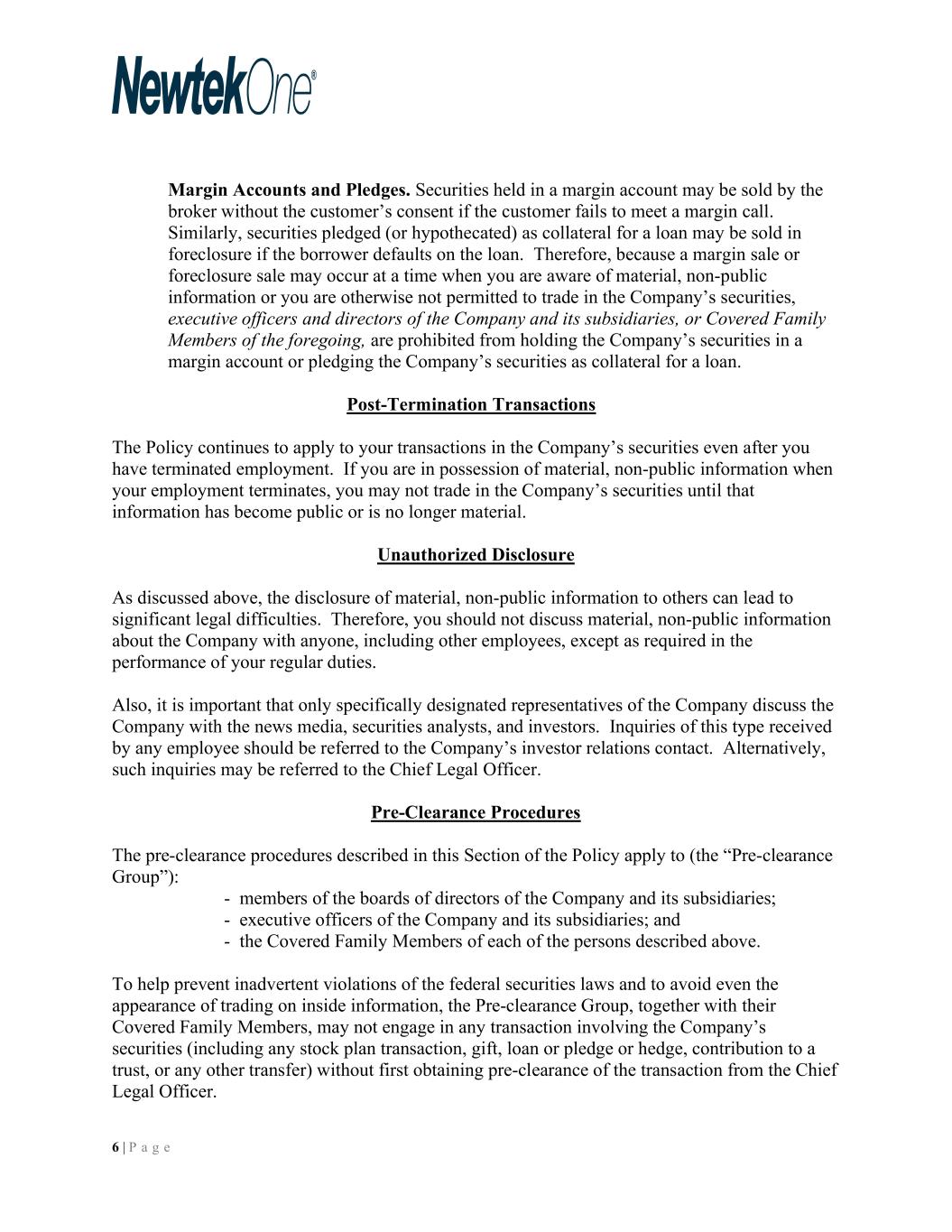
6 | P a g e Margin Accounts and Pledges. Securities held in a margin account may be sold by the broker without the customer’s consent if the customer fails to meet a margin call. Similarly, securities pledged (or hypothecated) as collateral for a loan may be sold in foreclosure if the borrower defaults on the loan. Therefore, because a margin sale or foreclosure sale may occur at a time when you are aware of material, non-public information or you are otherwise not permitted to trade in the Company’s securities, executive officers and directors of the Company and its subsidiaries, or Covered Family Members of the foregoing, are prohibited from holding the Company’s securities in a margin account or pledging the Company’s securities as collateral for a loan. Post-Termination Transactions The Policy continues to apply to your transactions in the Company’s securities even after you have terminated employment. If you are in possession of material, non-public information when your employment terminates, you may not trade in the Company’s securities until that information has become public or is no longer material. Unauthorized Disclosure As discussed above, the disclosure of material, non-public information to others can lead to significant legal difficulties. Therefore, you should not discuss material, non-public information about the Company with anyone, including other employees, except as required in the performance of your regular duties. Also, it is important that only specifically designated representatives of the Company discuss the Company with the news media, securities analysts, and investors. Inquiries of this type received by any employee should be referred to the Company’s investor relations contact. Alternatively, such inquiries may be referred to the Chief Legal Officer. Pre-Clearance Procedures The pre-clearance procedures described in this Section of the Policy apply to (the “Pre-clearance Group”): - members of the boards of directors of the Company and its subsidiaries; - executive officers of the Company and its subsidiaries; and - the Covered Family Members of each of the persons described above. To help prevent inadvertent violations of the federal securities laws and to avoid even the appearance of trading on inside information, the Pre-clearance Group, together with their Covered Family Members, may not engage in any transaction involving the Company’s securities (including any stock plan transaction, gift, loan or pledge or hedge, contribution to a trust, or any other transfer) without first obtaining pre-clearance of the transaction from the Chief Legal Officer.
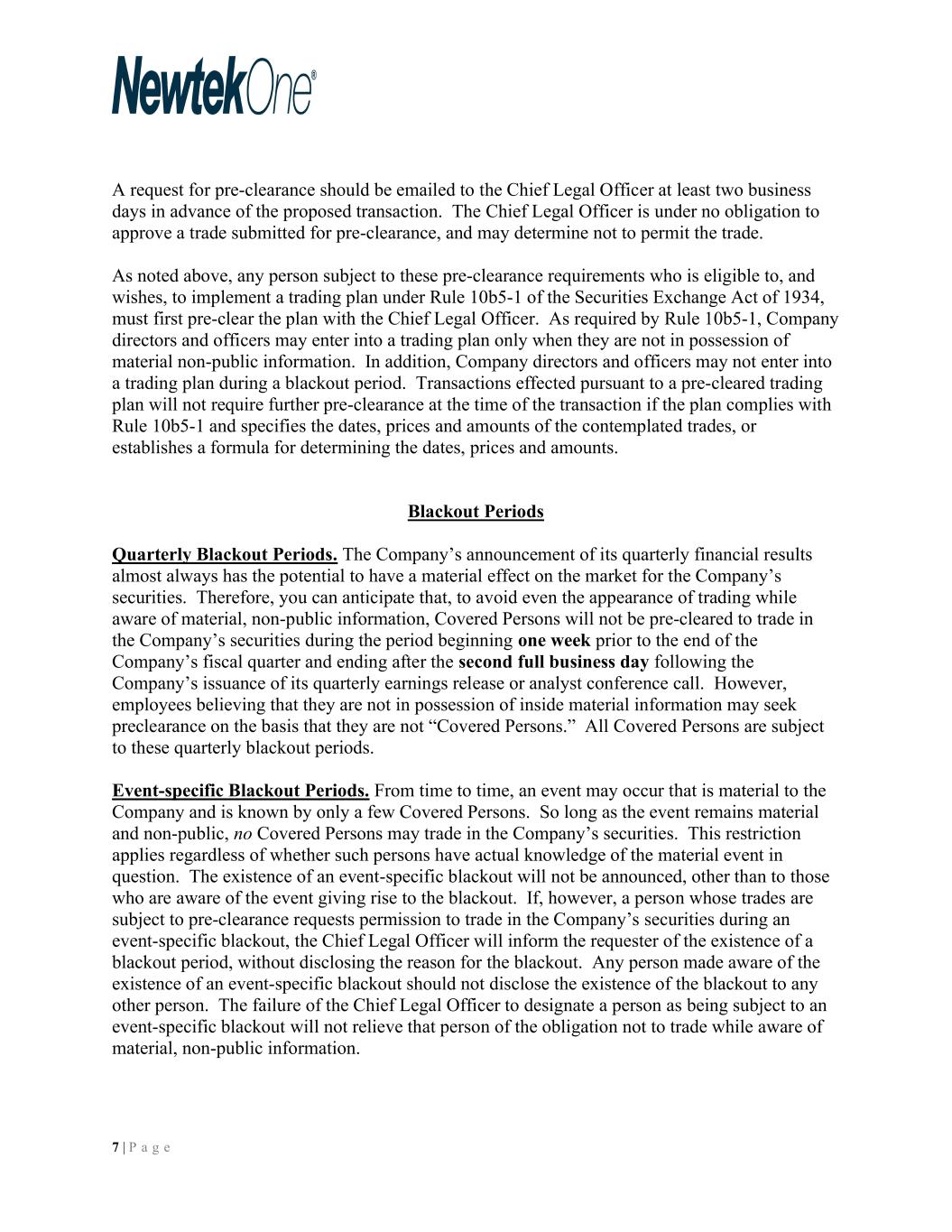
7 | P a g e A request for pre-clearance should be emailed to the Chief Legal Officer at least two business days in advance of the proposed transaction. The Chief Legal Officer is under no obligation to approve a trade submitted for pre-clearance, and may determine not to permit the trade. As noted above, any person subject to these pre-clearance requirements who is eligible to, and wishes, to implement a trading plan under Rule 10b5-1 of the Securities Exchange Act of 1934, must first pre-clear the plan with the Chief Legal Officer. As required by Rule 10b5-1, Company directors and officers may enter into a trading plan only when they are not in possession of material non-public information. In addition, Company directors and officers may not enter into a trading plan during a blackout period. Transactions effected pursuant to a pre-cleared trading plan will not require further pre-clearance at the time of the transaction if the plan complies with Rule 10b5-1 and specifies the dates, prices and amounts of the contemplated trades, or establishes a formula for determining the dates, prices and amounts. Blackout Periods Quarterly Blackout Periods. The Company’s announcement of its quarterly financial results almost always has the potential to have a material effect on the market for the Company’s securities. Therefore, you can anticipate that, to avoid even the appearance of trading while aware of material, non-public information, Covered Persons will not be pre-cleared to trade in the Company’s securities during the period beginning one week prior to the end of the Company’s fiscal quarter and ending after the second full business day following the Company’s issuance of its quarterly earnings release or analyst conference call. However, employees believing that they are not in possession of inside material information may seek preclearance on the basis that they are not “Covered Persons.” All Covered Persons are subject to these quarterly blackout periods. Event-specific Blackout Periods. From time to time, an event may occur that is material to the Company and is known by only a few Covered Persons. So long as the event remains material and non-public, no Covered Persons may trade in the Company’s securities. This restriction applies regardless of whether such persons have actual knowledge of the material event in question. The existence of an event-specific blackout will not be announced, other than to those who are aware of the event giving rise to the blackout. If, however, a person whose trades are subject to pre-clearance requests permission to trade in the Company’s securities during an event-specific blackout, the Chief Legal Officer will inform the requester of the existence of a blackout period, without disclosing the reason for the blackout. Any person made aware of the existence of an event-specific blackout should not disclose the existence of the blackout to any other person. The failure of the Chief Legal Officer to designate a person as being subject to an event-specific blackout will not relieve that person of the obligation not to trade while aware of material, non-public information.
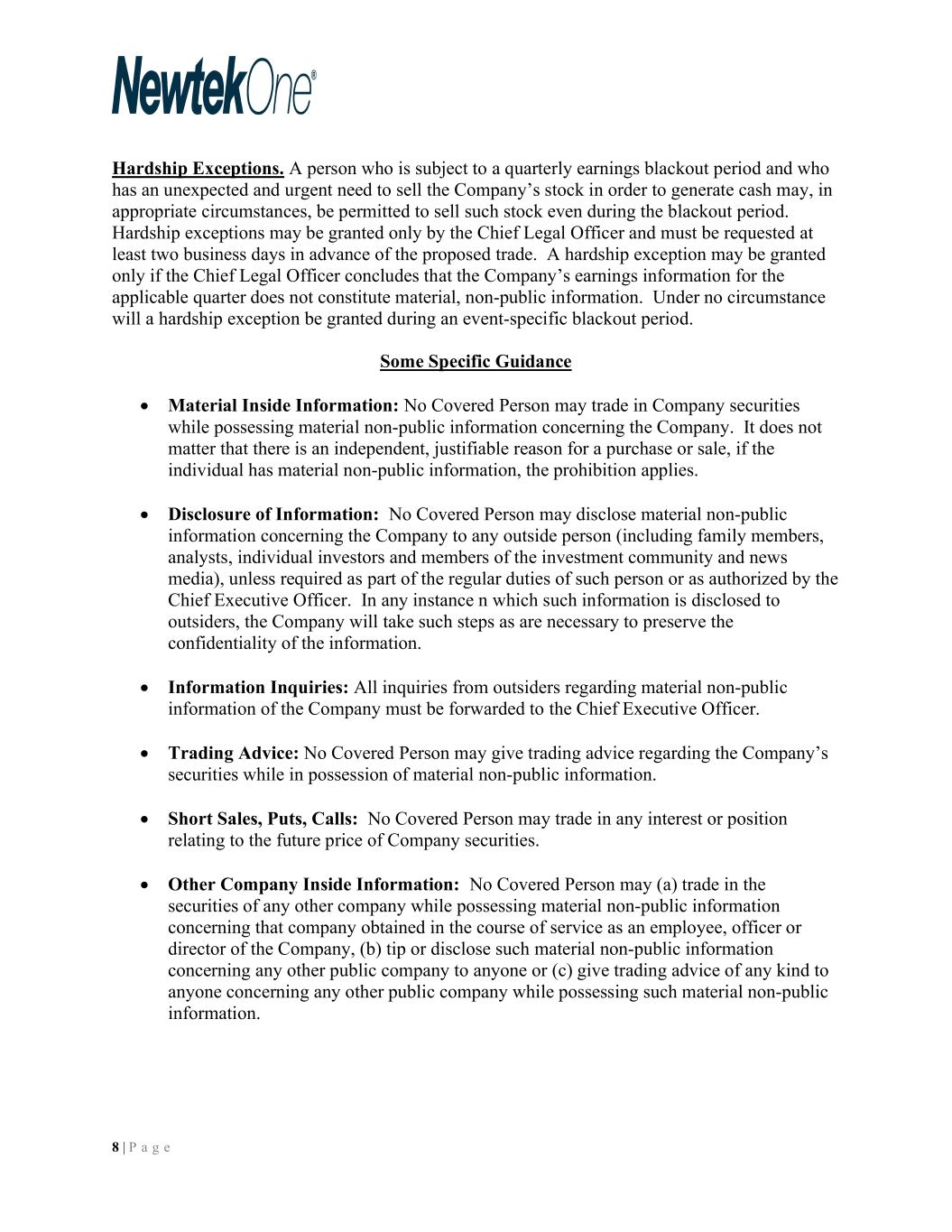
8 | P a g e Hardship Exceptions. A person who is subject to a quarterly earnings blackout period and who has an unexpected and urgent need to sell the Company’s stock in order to generate cash may, in appropriate circumstances, be permitted to sell such stock even during the blackout period. Hardship exceptions may be granted only by the Chief Legal Officer and must be requested at least two business days in advance of the proposed trade. A hardship exception may be granted only if the Chief Legal Officer concludes that the Company’s earnings information for the applicable quarter does not constitute material, non-public information. Under no circumstance will a hardship exception be granted during an event-specific blackout period. Some Specific Guidance Material Inside Information: No Covered Person may trade in Company securities while possessing material non-public information concerning the Company. It does not matter that there is an independent, justifiable reason for a purchase or sale, if the individual has material non-public information, the prohibition applies. Disclosure of Information: No Covered Person may disclose material non-public information concerning the Company to any outside person (including family members, analysts, individual investors and members of the investment community and news media), unless required as part of the regular duties of such person or as authorized by the Chief Executive Officer. In any instance n which such information is disclosed to outsiders, the Company will take such steps as are necessary to preserve the confidentiality of the information. Information Inquiries: All inquiries from outsiders regarding material non-public information of the Company must be forwarded to the Chief Executive Officer. Trading Advice: No Covered Person may give trading advice regarding the Company’s securities while in possession of material non-public information. Short Sales, Puts, Calls: No Covered Person may trade in any interest or position relating to the future price of Company securities. Other Company Inside Information: No Covered Person may (a) trade in the securities of any other company while possessing material non-public information concerning that company obtained in the course of service as an employee, officer or director of the Company, (b) tip or disclose such material non-public information concerning any other public company to anyone or (c) give trading advice of any kind to anyone concerning any other public company while possessing such material non-public information.
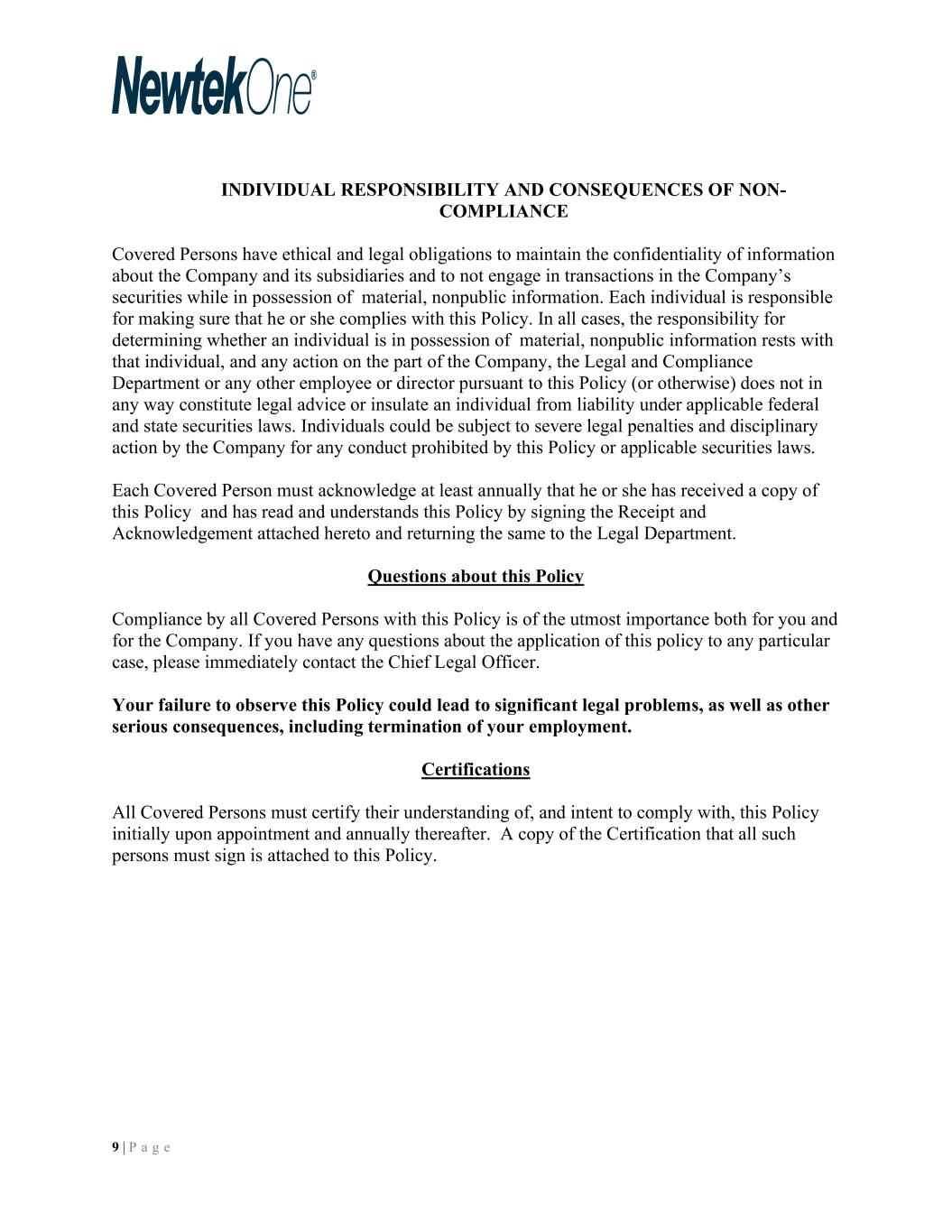
9 | P a g e INDIVIDUAL RESPONSIBILITY AND CONSEQUENCES OF NON- COMPLIANCE Covered Persons have ethical and legal obligations to maintain the confidentiality of information about the Company and its subsidiaries and to not engage in transactions in the Company’s securities while in possession of material, nonpublic information. Each individual is responsible for making sure that he or she complies with this Policy. In all cases, the responsibility for determining whether an individual is in possession of material, nonpublic information rests with that individual, and any action on the part of the Company, the Legal and Compliance Department or any other employee or director pursuant to this Policy (or otherwise) does not in any way constitute legal advice or insulate an individual from liability under applicable federal and state securities laws. Individuals could be subject to severe legal penalties and disciplinary action by the Company for any conduct prohibited by this Policy or applicable securities laws. Each Covered Person must acknowledge at least annually that he or she has received a copy of this Policy and has read and understands this Policy by signing the Receipt and Acknowledgement attached hereto and returning the same to the Legal Department. Questions about this Policy Compliance by all Covered Persons with this Policy is of the utmost importance both for you and for the Company. If you have any questions about the application of this policy to any particular case, please immediately contact the Chief Legal Officer. Your failure to observe this Policy could lead to significant legal problems, as well as other serious consequences, including termination of your employment. Certifications All Covered Persons must certify their understanding of, and intent to comply with, this Policy initially upon appointment and annually thereafter. A copy of the Certification that all such persons must sign is attached to this Policy.
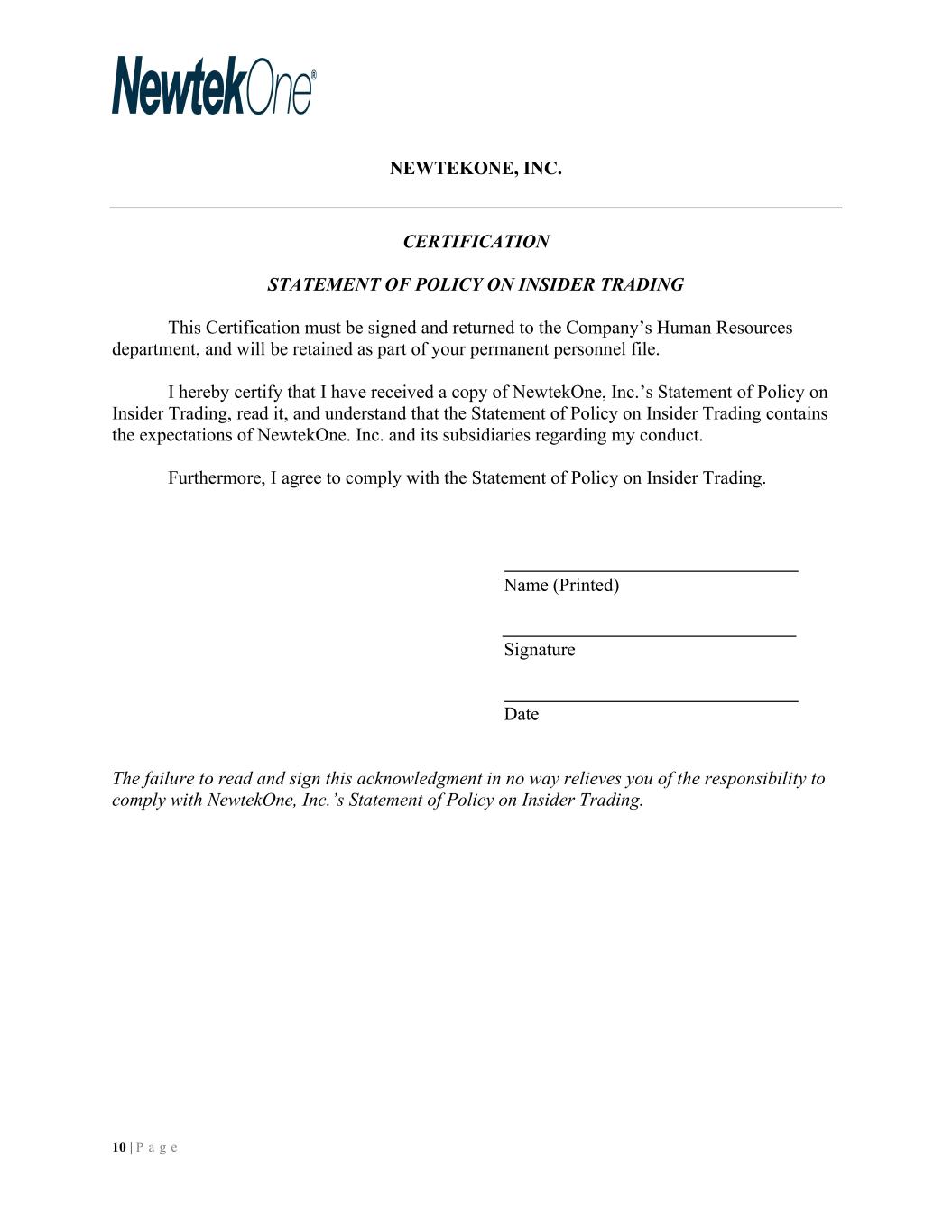
10 | P a g e NEWTEKONE, INC. CERTIFICATION STATEMENT OF POLICY ON INSIDER TRADING This Certification must be signed and returned to the Company’s Human Resources department, and will be retained as part of your permanent personnel file. I hereby certify that I have received a copy of NewtekOne, Inc.’s Statement of Policy on Insider Trading, read it, and understand that the Statement of Policy on Insider Trading contains the expectations of NewtekOne. Inc. and its subsidiaries regarding my conduct. Furthermore, I agree to comply with the Statement of Policy on Insider Trading. Name (Printed) Signature Date The failure to read and sign this acknowledgment in no way relieves you of the responsibility to comply with NewtekOne, Inc.’s Statement of Policy on Insider Trading.